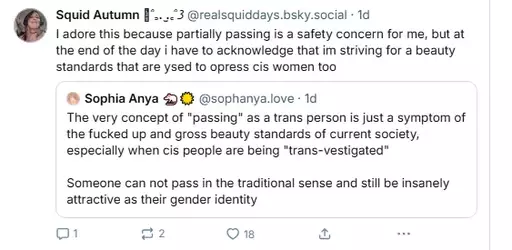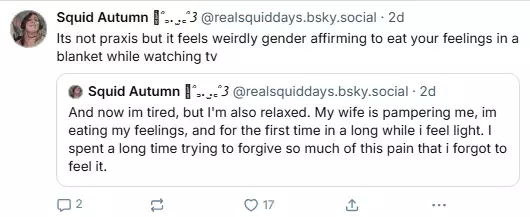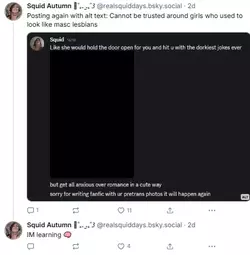What if Andrew Gosden Ran Away to Transition?
This theory has been floated here a few times, but it's usually met with hostility for various reasons, and the person floating the idea doesn't make the case very well. I think I can.
Personality profiles of adolescent male to female transitioners
I have been studying gender dysphoria and the motivations for transitioning since 2018. I am a trans person myself (though the other direction). I have spent the last four years primarily studying MtF transitioners (especially adolescent ones as they're the ones we have the most information on); listening to their parents, therapists, and the young people themselves. The parents and therapists (those supportive of transition and those unsupportive of it alike) virtually all agree on the personality profile these (I will use male language for clarity purposes) boys display.
These individuals usually share the following characteristics:
- Highly intelligent
- Excel in STEM subjects
- Passionate about computers and gaming
- Socially awkward or isolated
- Introverted and quiet
- Tend toward obsessive special interests
- Naive and overly trusting
- Ambiguously gay or bi, or uninterested in dating to the point of believing them asexual.
These traits are often associated with autism spectrum conditions, and a disproportionate number of MtF transitioners indeed have that diagnosis. I think most are subclinical though.
Anyone familiar with the case identifies that Andrew fits this profile closely. That's the background personality profile I am using to make this case.
Specific behaviors prior to the disappearance, as well as retrospective analysis from his parents.
A year before Andrew vanished, he attended a two-week NAGTY summer school program at Lancaster University. His parents noted a marked change in his demeanor afterward—he became more lively and engaged. Soon after, he quit the Boy Scouts and began growing his hair and nails long. It’s plausible that Andrew met someone at the summer school—perhaps an older trans girl from London—who inspired or supported his desire to transition.
Interestingly, Andrew reportedly had no social media accounts and declined a mobile phone, despite his parents offering to buy him one. In this way, Andrew breaks the mold of the typical gender dysphoric "autistic" boys, who love social media, as it provides social and intellectual engagement without having to physically interact with people. This suggests to me he may have had a secret phone and online presence under a female identity, unknown to his family. This could have been somehow facilitated by the theoretical older trans friend.
In interviews, Andrew’s father Kevin Gosden has acknowledged that Andrew may have been struggling with personal issues related to identity or sexuality. He has stated that Andrew might have been gay or bisexual, or confused about his identity. Kevin also reached out to the UK’s LGBT community in hopes that someone might recognize Andrew or come forward with information.
Parents of gender dysphoric teens often describe their children as “possibly gay or bi” or “confused about their sexuality,” especially when gender expression diverges from societal norms but the kid hasn't directly expressed same sex attraction. These descriptions often stem from a lack of awareness of the motivations behind cross gender expressions. His parents openness to these possibilities suggests that Andrew may have exhibited behaviors or preferences that led his family to question whether he was grappling with identity issues, but "gay" was the only framework they knew.
Additionally, Andrew’s favorite television show was The Fall and Rise of Reginald Perrin, a British sitcom about a man who fakes his own death to escape his conventional life and start anew. Both of Andrew’s parents have reflected on the possibility that this narrative may have resonated deeply with him. Kevin Gosden asked, “Did he decide to do the Reginald Perrin thing and reinvent himself? Or was something going on with him that he felt he couldn't tell us?” Similarly, Andrew’s mother remarked, “Maybe he wanted to step out of conventional life.”
The Andyroo online interaction from 2018 is evidence in favor of this theory.
In June 2018, the Gosden family received a tip about an online conversation involving a user named “Andyroo”, who claimed their boyfriend had left them and they needed £200 to cover rent. When someone offered to send money, the user responded that they didn’t have a bank account because they had “left home when they were 14.” This detail is striking—not only because it matches Andrew’s age at the time of his disappearance, but also because “Roo” was a childhood nickname used exclusively within the Gosden family. According to Kevin Gosden, “not many people know we called him Roo.” It's also important to note the person interacting with “Andyroo” did not use male pronouns, suggesting that the user may have been presenting as female. If the user was Andrew, the choice of that username could have been a nostalgic attempt to reconnect with his boyhood life and family identity.
The transition theory can also account for why he hasn't been found.
London is saturated with CCTV surveillance. If Andrew remained in the city, it’s likely he would have been seen again, unless he changed his appearance drastically. Given he didn't pack any extra clothes from home, it’s possible he intended to present as female immediately upon arrival. Passing as a girl would have been unusually easy for Andrew, given how young he looked for a 14 year old boy. A little makeup, feminine clothes, and a convincing wig would have easily done the trick. A wig would also conceal his distinctive right ear. It’s also possible he accessed hormone replacement therapy through underground means, a known practice among networks of trans women at the time.
Search efforts have focused on finding a male-presenting teenager. If Andrew transitioned and began living as a girl, especially with the help of someone else, he may have successfully evaded detection.
Wrapping it all together
While there is no definitive evidence that Andrew Gosden ran away to transition, the theory aligns with his psychological profile, behavioral changes, and the circumstances of his disappearance. If true, it would explain why Andrew has never been found—because those searching for him have been looking for someone who no longer exists in the form they expect.









































